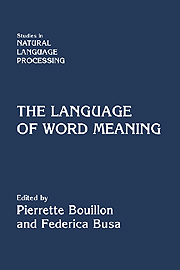Preface
Published online by Cambridge University Press: 07 October 2011
Summary
What is the meaning of a word? How can the few hundreds of thousands of words we know be used to construct the many millions of utterances we make and understand in a lifetime? It would appear we need more words than we have available to us, if classical wisdom on this subject is to be believed. The subject, of course, is lexical semantics, and classical wisdom can often be wrong. This field has undergone a radical shift in recent years, in large part because of two developments. First, formal frameworks for word meaning have been developed that greatly simplify the description of lexical classes and their properties. Second, we have at our disposal new compositional techniques that allow us to view word meaning as an integral part of the overall process of semantic interpretation. These and other factors have made the issues relating to ‘the meaning of a word’ some of the most central questions being addressed in the field of linguistics today. In fact, some classic issues have resurfaced with new data and arguments, such as the debate over analyticity and semantic knowledge, as well as the evidence of a distinction (or nondistinction) between lexical and world knowledge.
Waismann (1951) argued for what he called the ‘open texturedness’ of terms. Although he was mainly interested in how the notion applies to the nonexhaustive nature of material object statements and the absence of conclusive verification conditions, there is another sense in which this is an interesting property of language and language use; the infinite variability of reference in language is the direct product of the essential incompleteness of terms and their composition.
- Type
- Chapter
- Information
- The Language of Word Meaning , pp. xi - xiiPublisher: Cambridge University PressPrint publication year: 2001

